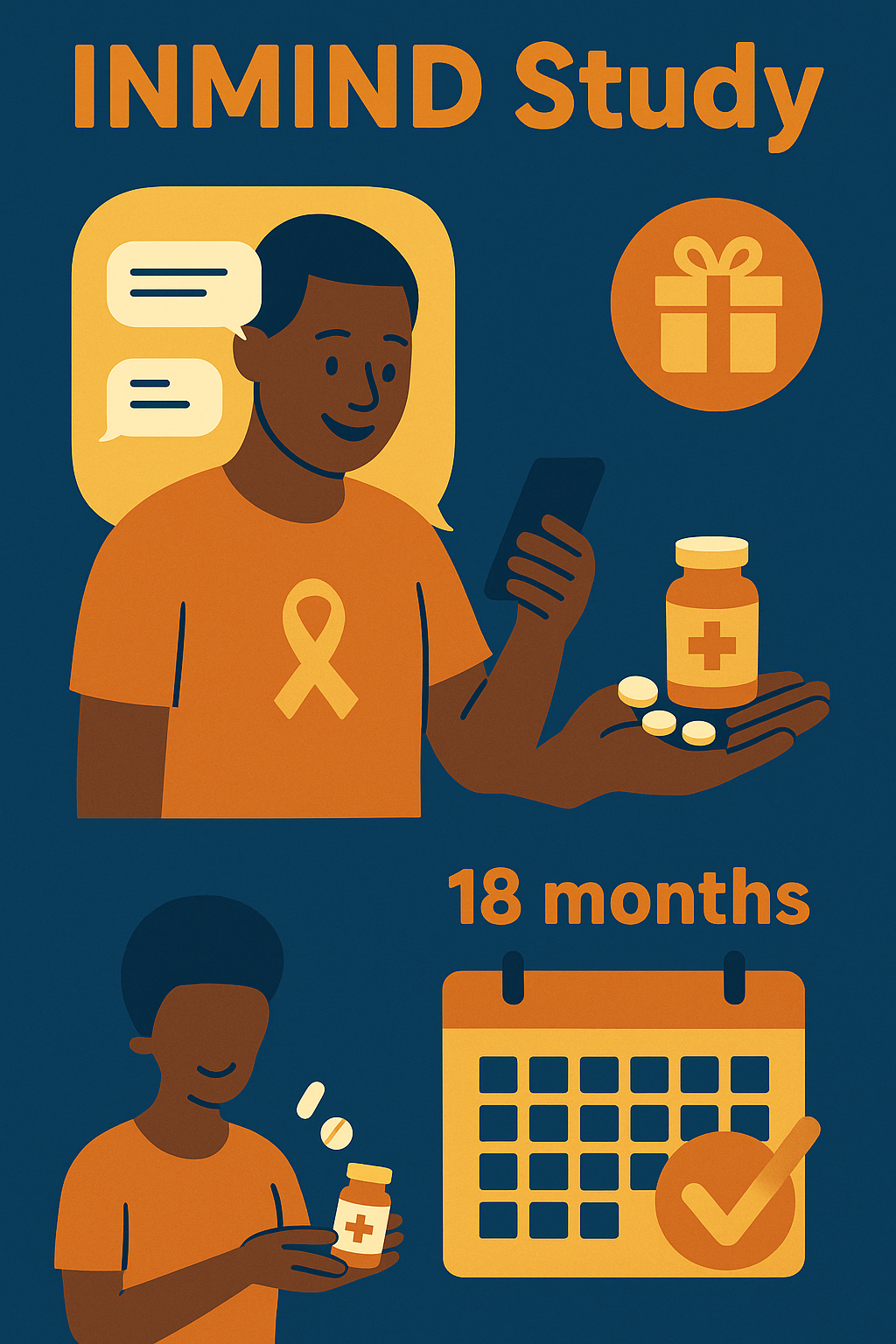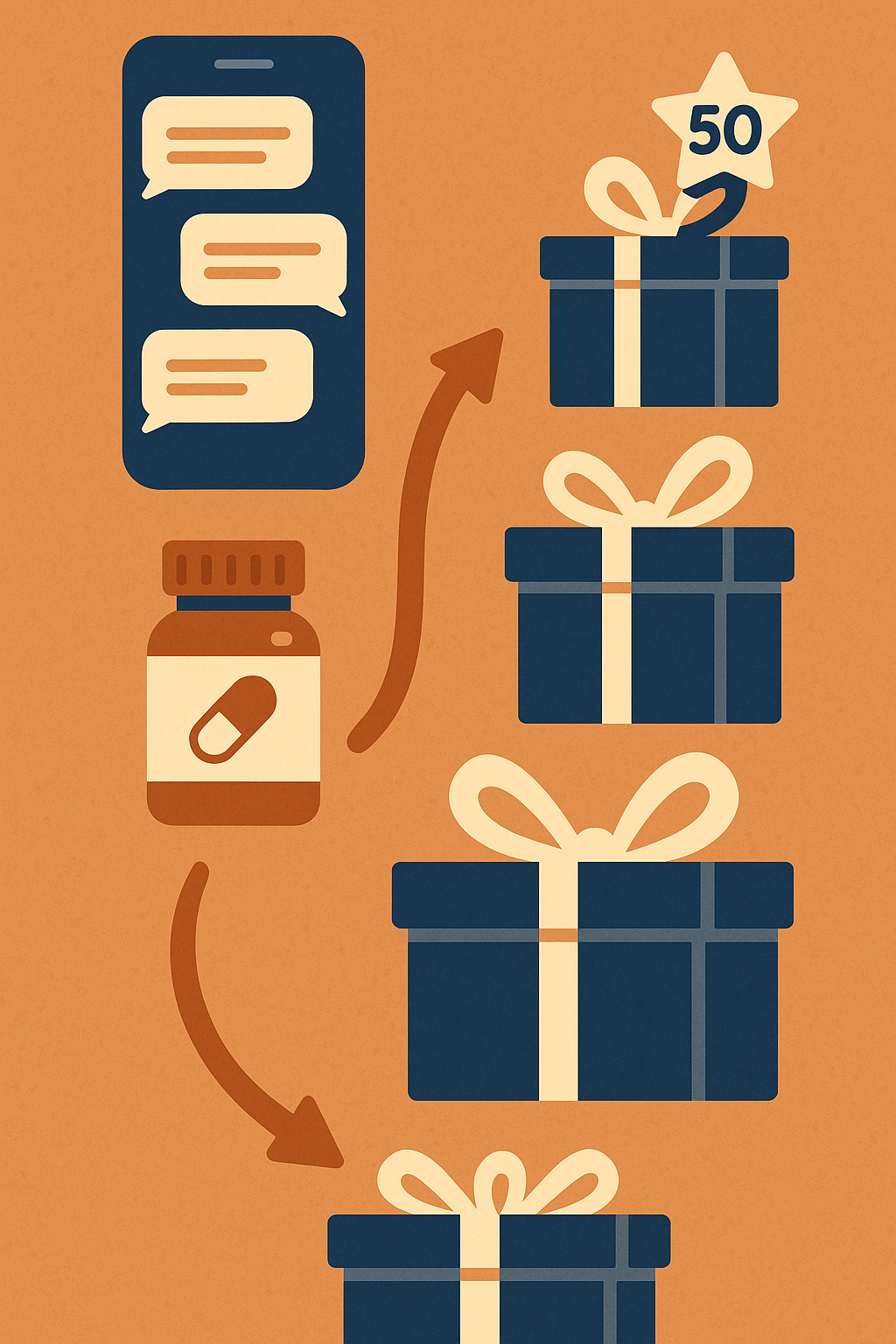Key Takeaways
- HIV/AIDS is a disease that affects the immune system and needs daily medicine to
control it.
- Taking medicine regularly can help people with HIV stay healthy and prevent the
virus from spreading.
- Clinical trials offer access to emerging treatments and expert care that may not
be available elsewhere.
- Joining a HIV/AIDS trial can help advance research while potentially improving
your quality of life with supervised support.
A New Horizon in HIV/AIDS Research
Clinical trials are important for discovering better treatments and helping people live healthier lives. This
feature highlights the INMIND trial (NCT06949774). The study is testing new ways to support people with
HIV/AIDS in taking their antiretroviral therapy (ART) medicine consistently, which is crucial for controlling
the virus and improving health.
Understanding new research is a top priority for patients and caregivers seeking information on treatment
options, managing side effects, and exploring potential avenues for improvement. This post aims to provide a
clear overview of what this trial is about and how it could potentially impact the future of HIV/AIDS care.
Understanding HIV/AIDS and the Need for Better Medicine
Habits
HIV/AIDS is a viral infection that attacks the immune system, making it harder for the body to fight
illnesses. Taking antiretroviral therapy (ART) daily helps control the virus, but many people find it hard to
take their medicine every day. Current treatments help, but studies like the INMIND trial aim to find better
ways to support patients, especially those who struggle to keep a steady routine for taking their medicine.
Symptoms of HIV can include fatigue, weight loss, and infections, but with medicine, many people stay healthy
and active.
Curated Facts and Expert Data
PubMed: This study looked at people in Uganda living with HIV who got daily text reminders and money
incentives to help them remember to take their HIV medicine (called ART). Patients who got both the text
messages and the financial rewards were better at taking their medicine on time, and this good habit lasted
even after the reminders and rewards stopped.
[1].
PubMed: This article describes how the INMIND trial was set up. It explains that new patients starting HIV
treatment received regular text message reminders and could earn small rewards if they took their medicine
consistently. The goal was to help people develop a daily routine for taking their HIV pills, making it
easier to stick to treatment over time.
[2].
HIV/AIDS Symptoms
HIV/AIDS can manifest in various ways, but some of the most common symptoms include:
- Feeling very tired (fatigue)
- Weight loss
- Frequent infections
- Fever and night sweats
- Swollen lymph nodes
These symptoms can make daily life difficult. Understanding them helps patients and caregivers see why
sticking to medicine is so important. The INMIND trial works on helping people build strong daily habits to
take their medicine on time.
Introducing the Trial's Focus: Behavioral Support with Text
Messages and Incentives
The INMIND trial is testing behavioral methods to improve how well people with HIV stick to their
antiretroviral treatment (ART).
What is the INMIND Intervention?
INMIND uses daily text messages to remind and encourage patients to take their medicine at the same time every
day. For those who need extra help, the trial offers prize drawings as a fun way to reward good
medicine-taking habits. This helps turn medicine-taking into a daily habit, improving health.
This study is designed to find out how well these text messages and prizes work together to help people take
their medicine regularly over a long time.
Mechanism of Action
The study uses behavioral science, which means it looks at what motivates people’s actions and how small
rewards or reminders can help build good habits. Text messages serve as daily reminders, and prize incentives
provide motivation by making medicine-taking feel rewarding.
The trial combines daily reminders with a prize system that increases rewards over time for consistent
medicine-taking. This step-up approach is new and may help more people stick to their treatment better than
existing methods.
Trial design
The study uses a smart design where people start with simple reminders. If that’s not enough, they can get
prize incentives to boost their motivation. This helps find the best way to support different patients.
Why is this Trial Important for Patients?
The INMIND (NCT06949774) embodies this important research role by offering new ways to improve medicine habits
for HIV patients.
-
Helping people with HIV take their medicine every day, which can keep the virus under control and improve
health.
-
Testing easy and fun ways to make taking medicine less stressful and more rewarding.
-
Building knowledge about what helps people keep good health habits so future treatments can be even better.
Who Can Participate? Eligibility at a Glance
Clinical trials have specific criteria to ensure the safety of participants and the validity of the study
results. For the INMIND trial, key eligibility criteria include:
- Age: Participants must be 18 years or older.
- Diagnosis: Must have started antiretroviral therapy (ART) within the last month at Mildmay or another
clinic.
- Language: Must speak and understand English or Luganda.
- Phone Access: Must have a cell phone or regular access to one to receive text messages.
- Consent and Ability: Must be mentally able to consent and willing to use a Wisepill device that tracks
medicine use.
- Exclusions: Not mentally fit to consent or unwilling/unable to use the Wisepill device.
What to Expect as a Participant
If you join the INMIND trial, here is what will happen:
-
Screening: A series of tests and evaluations to confirm your eligibility at no cost.
-
Treatment Period: You will receive care as usual plus either daily text reminders or text reminders combined
with chances to win prizes for taking your pills on schedule for several months. These come at no cost.
-
Monitoring: You will have regular check-ins and use a special pill container that tracks when you take your
medicine to help researchers see how well the support is working. The team will help with any side effects
and questions along the way.
-
Follow-up: After the main treatment time, you will be followed for up to 18 months to see how well you keep
up medicine habits and health.
The duration of your participation will vary depending on the study design, but the research team will explain
the full commitment before enrollment.
Potential Risks and Benefits
Like all medical interventions, participation in a clinical trial carries both potential benefits and risks.
Potential Benefits:
- Access to a new treatment before it’s widely available.
- Close monitoring by a team of medical experts.
- Contributing to medical knowledge that could help future patients with HIV/AIDS.
Potential Risks:
- The new treatment may not be effective for you.
- You might find the monitoring or prize system challenging or less helpful, and some side effects from ART
can happen but are managed by your care team.
- The time commitment for study visits and procedures.
A detailed explanation of all potential risks and benefits will be provided during the informed consent
process.
How to Learn More and Get Involved
The INMIND trial (NCT06949774) is currently recruiting participants at Mildmay Uganda in Kampala, Uganda.
If you are interested in potentially participating, it is crucial to discuss these criteria with your
healthcare provider. They can determine if you meet the specific requirements. You may share this link with
your provider’s email address, or have them visit ClinQuestAi.com and type in NCT06949774.
You can also:
Remember: Deciding to participate in a clinical trial is a personal choice. It’s important to discuss all
aspects of the trial with your healthcare provider to ensure it’s the right decision for your individual
health situation.
Further Reading:
Our Commitment to Accuracy and Trust
All health-related content on this website, whether drafted by our team or with AI assistance, undergoes a
rigorous human review process before publication. Every article is fact-checked, edited, and medically
reviewed by a licensed medical professional with relevant expertise. Our goal is to provide information that
is accurate, aligned with current medical consensus, empathetic, and useful for patients and caregivers. We
are committed to transparency, clearly citing sources and displaying author and reviewer credentials to uphold
the highest standards of E-E-A-T (Experience, Expertise, Authoritativeness, and Trustworthiness).

